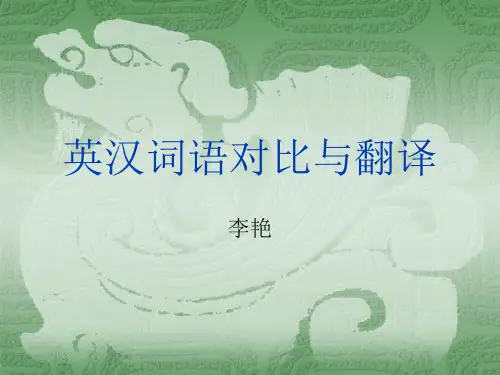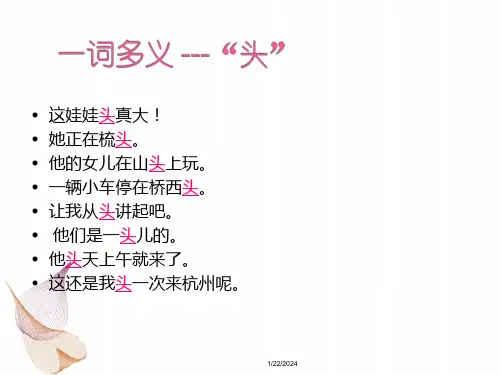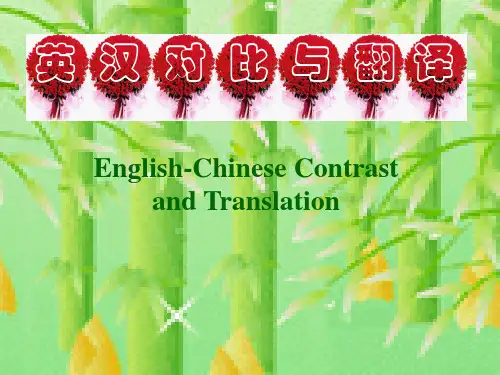汉英词汇比较与翻译共50页
- 格式:ppt
- 大小:3.78 MB
- 文档页数:50
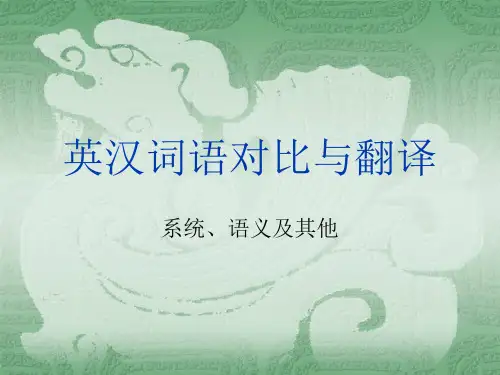

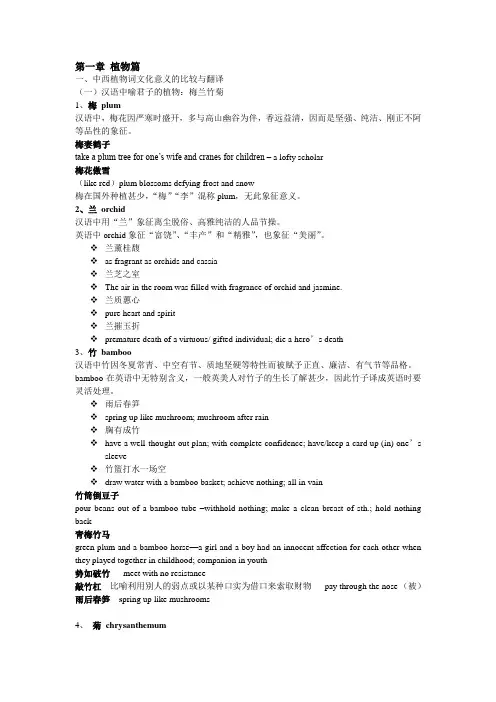
第一章植物篇一、中西植物词文化意义的比较与翻译(一)汉语中喻君子的植物:梅兰竹菊1、梅plum汉语中,梅花因严寒时盛开,多与高山幽谷为伴,香远益清,因而是坚强、纯洁、刚正不阿等品性的象征。
梅妻鹤子take a plum tree for one’s wife and cranes for children – a lofty scholar梅花傲雪(like red)plum blossoms defying frost and snow梅在国外种植甚少,“梅”“李”混称plum,无此象征意义。
2、兰orchid汉语中用“兰”象征离尘脱俗、高雅纯洁的人品节操。
英语中orchid象征“富饶”、“丰产”和“精雅”,也象征“美丽”。
兰薰桂馥as fragrant as orchids and cassia兰芝之室The air in the room was filled with fragrance of orchid and jasmine.兰质蕙心pure heart and spirit兰摧玉折premature death of a virtuous/ gifted individual; die a hero’s death3、竹bamboo汉语中竹因冬夏常青、中空有节、质地坚硬等特性而被赋予正直、廉洁、有气节等品格。
bamboo在英语中无特别含义,一般英美人对竹子的生长了解甚少,因此竹子译成英语时要灵活处理。
雨后春笋spring up like mushroom; mushroom after rain胸有成竹have a well-thought-out plan; with complete confidence; have/keep a card up (in) one’s sleeve竹篮打水一场空draw water with a bamboo basket; achieve nothing; all in vain竹筒倒豆子pour beans out of a bamboo tube –withhold nothing; make a clean breast of sth.; hold nothing back青梅竹马green plum and a bamboo horse—a girl and a boy had an innocent affection for each other when they played together in childhood; companion in youth势如破竹meet with no resistance敲竹杠比喻利用别人的弱点或以某种口实为借口来索取财物pay through the nose (被)雨后春笋s pring up like mushrooms4、菊chrysanthemum又叫“黄花”。
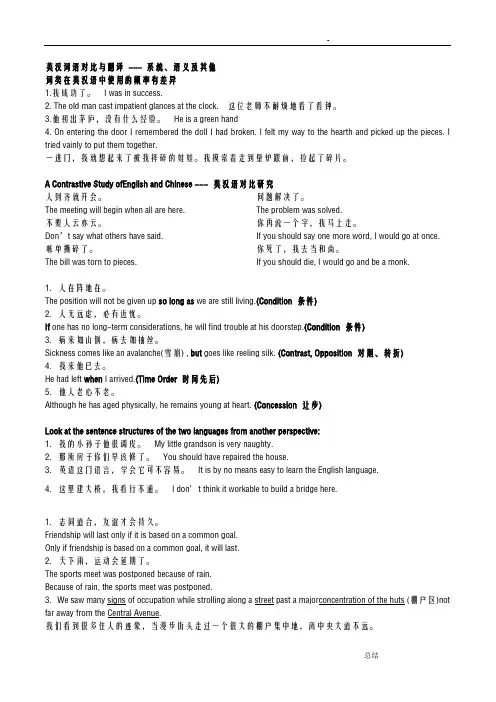
英汉词语对比与翻译--- 系统、语义及其他词类在英汉语中使用的频率有差异1.我成功了。
I was in success.2. The old man cast impatient glances at the clock. 这位老师不耐烦地看了看钟。
3.他初出茅庐,没有什么经验。
He is a green hand4. On entering the door I remembered the doll I had broken. I felt my way to the hearth and picked up the pieces. I tried vainly to put them together.一进门,我就想起来了被我摔碎的娃娃。
我摸索着走到壁炉跟前,捡起了碎片。
A Contrastive Study ofEnglish and Chinese --- 英汉语对比研究人到齐就开会。
The meeting will begin when all are here. 不要人云亦云。
Don’t say what others have said.帐单撕碎了。
The bill was torn to pieces. 问题解决了。
The problem was solved.你再说一个字,我马上走。
If you should say one more word, I would go at once. 你死了,我去当和尚。
If you should die, I would go and be a monk.1.人在阵地在。
The position will not be given up so long as we are still living.(Condition 条件)2.人无远虑,必有近忧。
If one has no long-term considerations, he will find trouble at his doorstep.(Condition 条件)3.病来如山倒,病去如抽丝。

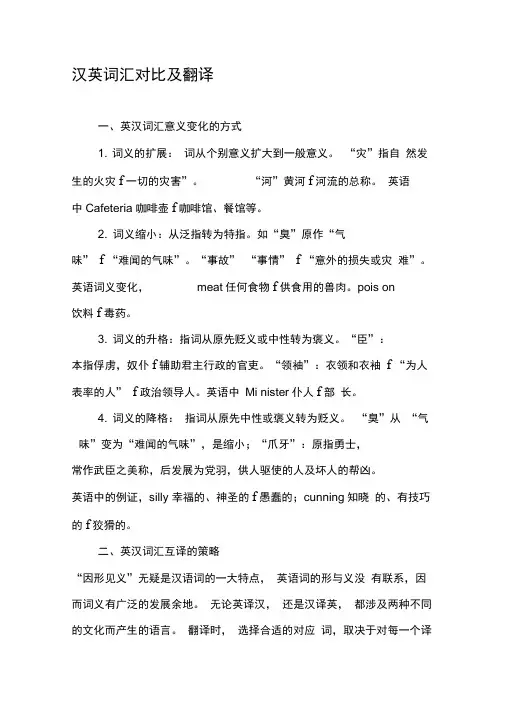
汉英词汇对比及翻译一、英汉词汇意义变化的方式1. 词义的扩展:词从个别意义扩大到一般意义。
“灾”指自然发生的火灾f一切的灾害”。
“河”黄河f河流的总称。
英语中Cafeteria 咖啡壶f咖啡馆、餐馆等。
2. 词义缩小:从泛指转为特指。
如“臭”原作“气味” f “难闻的气味”。
“事故” “事情” f “意外的损失或灾难”。
英语词义变化,meat任何食物f供食用的兽肉。
pois on饮料f毒药。
3. 词义的升格:指词从原先贬义或中性转为褒义。
“臣”:本指俘虏,奴仆f辅助君主行政的官吏。
“领袖”:衣领和衣袖f “为人表率的人” f政治领导人。
英语中Mi nister仆人f部长。
4. 词义的降格:指词从原先中性或褒义转为贬义。
“臭”从“气味”变为“难闻的气味”,是缩小;“爪牙”:原指勇士,常作武臣之美称,后发展为党羽,供人驱使的人及坏人的帮凶。
英语中的例证,silly 幸福的、神圣的f愚蠢的;cunning知晓的、有技巧的f狡猾的。
二、英汉词汇互译的策略“因形见义”无疑是汉语词的一大特点,英语词的形与义没有联系,因而词义有广泛的发展余地。
无论英译汉,还是汉译英,都涉及两种不同的文化而产生的语言。
翻译时,选择合适的对应词,取决于对每一个译出和译入词含义的正确理解和透彻品位。
1. 准确理解词义不同的词义中选出最确切的词义,这是正确理解原文的一个基本环节,也是翻译之本。
从翻译角度来说,选词义时,必须掌握下面三项要领:根据上下文辨词义、论褒贬、看搭配。
(1)据上下文辨词义:形容词“ good”,一般意义为“好的”,但在不同上下文里含义不同,如:It was a good dinner. 这是一个丰盛的宴会。
He proved to be a good listener. 他这个人善于倾听。
又如:汉译英“说”这个词根据不同上下文可译成:speak, tell , say, express , mention 等。

